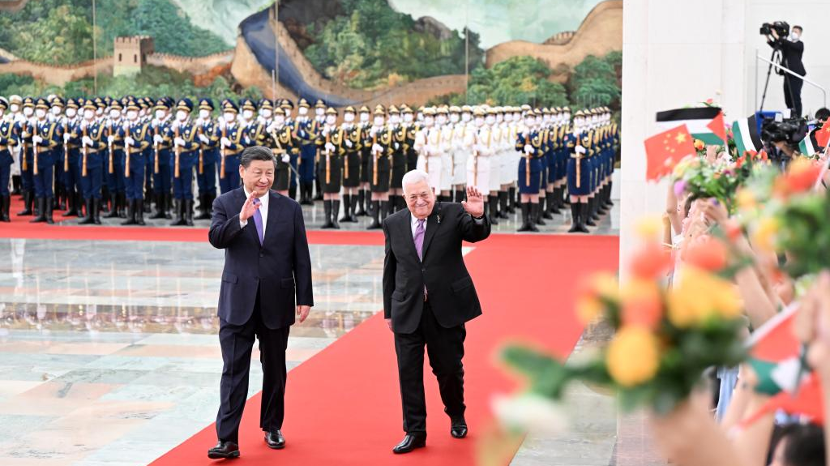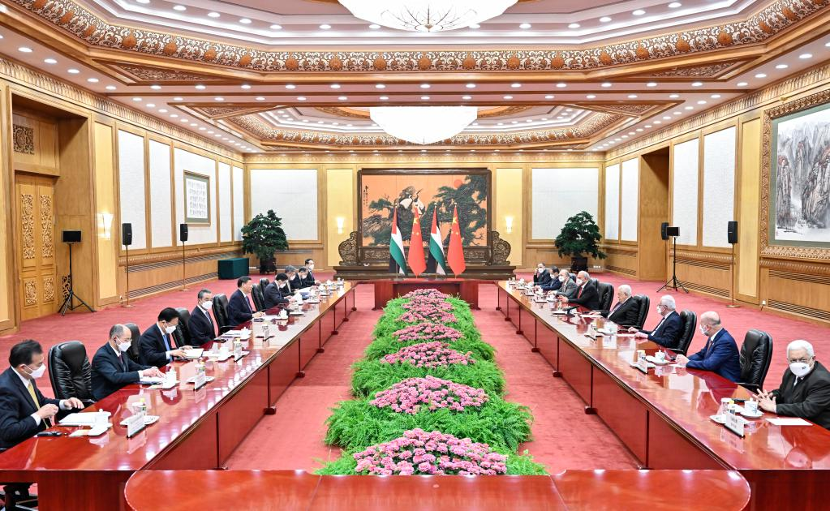
Chinese President Xi Jinping holds a welcoming ceremony for Palestinian President Mahmoud Abbas in the Northern Hall of the Great Hall of the People before their talks in Beijing, China, June 14, 2023. /Xinhua
Chinese President Xi Jinping holds a welcoming ceremony for Palestinian President Mahmoud Abbas in the Northern Hall of the Great Hall of the People before their talks in Beijing, China, June 14, 2023. /Xinhua
Editor's note: Xin Ge, a special commentator on current affairs for CGTN, is an associate professor at the School of Public Economics and Administration, Shanghai University of Finance and Economics. The article reflects the author's opinions and not necessarily the views of CGTN.
At the invitation of Chinese President Xi Jinping, Palestinian President Mahmoud Abbas is paying a state visit to China from June 13 to 16. This is Abbas's fifth visit to China, which came against the backdrop of a positive trend towards reconciliation in the Middle East following the resumption of the diplomatic relations between Iran and Saudi Arabia under China's mediation. Therefore, it is widely expected that, apart from cementing bilateral traditional friendship, China will put more effort into promoting peace, stability and development in the region under the guidance of the Global Security Initiative (GSI) proposed by Xi.
China and Palestine share a long-standing friendship, with China being among the first countries to recognize both the Palestine Liberation Organization (PLO) and the State of Palestine. The PLO established an office in Beijing in May 1965, and this was recognized as a diplomatic mission. In November 1988, China established formal diplomatic relations with Palestine. Therefore, the 35th anniversary of the establishment of diplomatic ties this year adds special significance to Abbas's visit.
The Palestinian question lies at the crux of the Middle East issue and matters to the region's peace and stability, as well as global equity and justice. The Palestine-Israel conflict has its roots in the late 19th and early 20th centuries and has remained unsettled due to the U.S.'s intermeddling in Israel. Since the suspension of the Israeli-Palestinian peace talks in 2014, the peace process has remained at a standstill, and the "Quartet" mechanism composed of the United Nations, the United States, Russia, and the European Union has become ineffective in recent years. In May 2021, the largest-scale armed conflict since 2014 erupted between Israel and Palestine, resulting in the deaths of over 200 Palestinians and at least 12 Israelis. In the past two months, tensions have been mounting with Israel intensifying airstrikes on military posts in the Gaza Strip and Lebanon in response to rockets fired from the areas into Israel in April.
Over the last decade, as a preeminent global power, the United States has adopted an unfavorable stance, as well as partial policies and actions, on Middle Eastern issues, including but not limited to the Palestine-Israel conflict, the Iranian nuclear deal, and the Syrian crisis. Regrettably, these measures have not only failed to address regional challenges but have also exacerbated tensions and disorder. The so-called Deal of the Century plan by the U.S. under the Donald Trump administration was only agreed upon by the U.S. and Israel and based on the unconditional surrender of the Palestinians, rendering it an unacceptable and inequitable proposition.

Chinese President Xi Jinping holds talks with Palestinian President Mahmoud Abbas at the Great Hall of the People in Beijing, China, June 14, 2023. /Xinhua
Chinese President Xi Jinping holds talks with Palestinian President Mahmoud Abbas at the Great Hall of the People in Beijing, China, June 14, 2023. /Xinhua
In contrast, China has approached the Middle East issues with no hidden motives and is guided solely by a sense of justice. China is committed to preventing the Palestinian issue from being marginalized in the intricate and constantly changing regional and international milieu. Xi has propounded China's "four-point proposal" on resolving the Palestinian issue during his meetings with Abbas on May 6, 2013, and July 18, 2017, respectively. In the aftermath of the 2021 Israel-Palestine conflict, as the rotating president of the United Nations Security Council, China advocated for five discussions on the Palestinian issue and ultimately issued a presidential statement. Furthermore, China has proposed three routes for implementing the "two-state solution" and hosted seminars for peace activists from Palestine and Israel. To date, five Chinese special envoys to the Middle East have undertaken numerous trips to mediate and broker the Israel-Palestine conflict in pertinent countries such as Palestine, Israel, Egypt, and Jordan.
Moreover, China could play a special constructive role in promoting the de-escalation of the Palestine-Israel conflict as it has been a trustworthy partner of Palestine and has also maintained close and pragmatic cooperation with Israel. China has been tirelessly advocating for the early achievement of a comprehensive, just, and lasting solution to the Palestinian question for many years. Recently, China has put forward its proposals and expressed its welcome to negotiators from both sides of Palestine and Israel to hold direct talks in China.
No one emerges victorious in conflicts, and no one loses in peace. China's Global Security Initiative – a principled and conscientious approach to upholding global peace and development – has garnered widespread recognition from the global community. This is the very reason why China has been able to forge friendships in the Middle East and beyond – China's friends and acquaintances span the gamut of bilateral "foes" such as Saudi Arabia and Iran, Russia and Ukraine, or Palestine and Israel. This is the result of China's overarching foreign policy objective of establishing a community of shared future for mankind, which in turn will serve to foster and propagate the concept of "shared destiny" in more regions.
(If you want to contribute and have specific expertise, please contact us at opinions@cgtn.com. Follow @thouse_opinions on Twitter to discover the latest commentaries in the CGTN Opinion Section.)